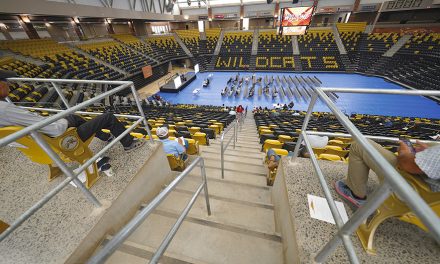
Monument Valley park reopens to public
By Krista Allen
Special to the Times
OLJATO-TSÉBII’NDZISGAII, Utah
The Monument Valley Tribal Park has reopened to the public after it closed yesterday following a fellowship filming without a filming permit on tribal lands, affecting the tour operators that provide various types of tours here.
“We had a (newlywed) couple who traveled 300 miles to honeymoon (here) and take a tour with us,” said Lavar Black, co-operator of Roy Black’s Guided Tours. “It was an opportunity missed.”
Black says November is not an especially prominent tourist month, so he sees around four customers a day during the off-season. He added that he lost around 12 customers and had to turn them away because of the closure, which initially started on Nov. 27, according to tour operators.
Shannon Cly, owner of Three Sister Navajo Guided Tour and a resident inside the park, said she worked with her customers to either reschedule or refund a tour. During the off-season, Cly says, she does up to two tour runs a day in Monument Valley. Each run carries a total of 15 people.
“We didn’t know what was going on,” Cly said. “They (Navajo Parks and Recreation) left us in the dark.”
Black says park officials did not inform him or his staff on Tuesday when tour operators began seeing law enforcement agencies blocking the park entrance.
“No one called around (to inform us) that we’re having a shutdown,” said Black, whose tour operation owns a stable near Rain God Mesa inside the park. “We had to hear it off of social media. We were left in the dark.”
Black says he could not get into the park Tuesday to feed and water his 15 horses that taxi his clients through the landscape.
“That was a big problem because they’re live animals and they need to be fed,” Black said.
“They (park officials) forced people to evacuate the entire area,” Cly added.
Louise Tsinijinnie, spokesperson for Navajo Parks and Recreation, said the park was officially closed on Wednesday and Thursday, during which the fellowship was ousted while filming for “Witness in the Desert,” a project lead by Derek Broes, better known as “Global Witness.”
“They didn’t have anything such as a backcountry permit or a filming permit,” Tsinijinnie said, “or any type of land-usage fee at all.”
Tsinijinnie explained that when a filming crew wants to film in the Navajo Nation, those companies have to go through a permit certification and then the agency charges them for two things: using the land and filming on the land.
In order for a filming crew to film on the Navajo Nation, Tsinijinnie says the crew must pay a $150-dollar land-usage fee (depending on what type of filming they’re doing) and an application fee that ranges from $50 to $100.
“Say if you’re bringing in … a Jeep with a filming crew of 50 people with (around) 10 cameras, then the (land-usage fee) ranges from $1,000 to $10,000, depending on how long they want to film per day,” Tsinijinnie explained. “And then we would have people monitoring them and seeing what they do, meaning that they stay in the area they were cited.”
And if they go out of their cited areas, film crews will be charged a disturbance fee.
Broes and his filming crew were escorted out of the park and then off of the Navajo Nation Thursday night, according to law enforcement.
“We had people calling the park (over the three-day period) asking, ‘Have you see this YouTube video?’” Tsinijinnie said. “We were like, ‘What?’”
In a video on his YouTube channel Global Witness, Broes said Monument Valley Tribal Park was shut down to prevent him and his filming crew from entering the park to assist and fix fences for valley residents.
“We’ve been told that we cannot go into the park. In fact, they didn’t just shut it down for us, but they shut it down for everybody,” Broes said. “People going to the hotel, you name it. So, it’s been quite an adventure.”
Tsinijinnie said Broes’ filming crew had a group of about 50 individuals wanting to go inside the park to volunteer and fix fences for residents.
“But why were they filming?” asks Tsinijinnie. “Valley residents didn’t even inform us either that this is (volunteer project) would be happening. Usually the residents give a consent and give us a copy so that they’re covered insurance-wise for (the people that would be volunteering).”
To read the full article, pick up your copy of the Navajo Times at your nearest newsstand Thursday mornings!
Are you a digital subscriber? Read the most recent three weeks of stories by logging in to your online account.







 Highway 264,
Highway 264, I-40, WB @ Winslow
I-40, WB @ Winslow